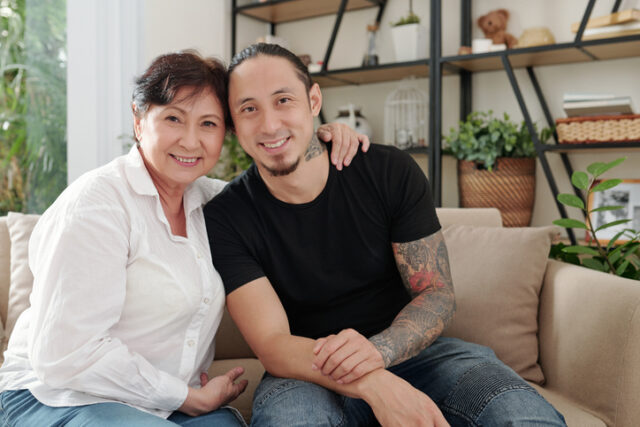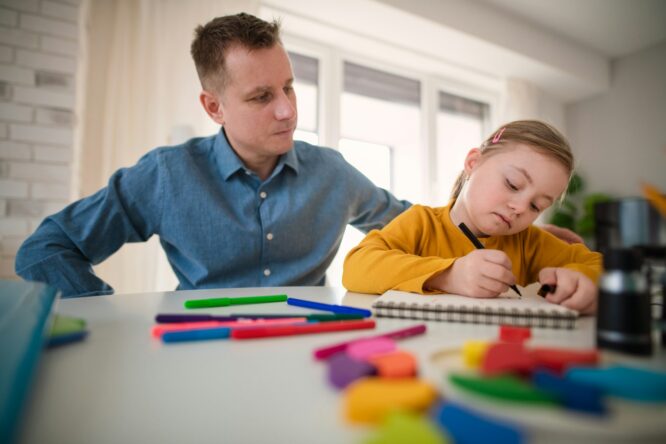Parenting is a balancing act, and most parents try to treat their children equally (“try” being the operative term).

But sometimes, whether due to circumstances, personalities, or unintentional bias, they end up relying more heavily on one child than the other. While that dynamic might feel practical in the moment, it can have lasting effects on both the kids (who might not even be kids anymore!) and the family as a whole. Here are just a few things that can happen in this situation.
1. The go-to kid feels like they have to fix everything.

If you’re the one your parents always turn to for help—whether it’s dealing with family drama, providing emotional support, or fixing things around the house—you might end up feeling like it’s all on your shoulders. Over time, the responsibility can get overwhelming, leading to burnout. It can also make it harder for you to set boundaries with other people, including your parents. When you’re always the go-to person, it can feel like your needs come last, which can get pretty tiring.
2. The overlooked child starts to feel invisible.

On the flip side, if you’re the child who doesn’t get relied on as much, it’s easy to feel a bit invisible. It can be easy to interpret the lack of attention or responsibility as a sign that you’re less important or less capable. That can chip away at your confidence, and as you get older, it might affect your self-esteem, even if it wasn’t the intention. That feeling of being overlooked can stick with you for years, and before you know it, you’re questioning your worth.
3. Sibling tension is inevitable.

If one child is consistently relied on, there’s bound to be some tension between siblings. The “go-to” kid might resent feeling like they’re the one who always has to step up, while the other sibling might feel jealous of all the attention and responsibility their sibling gets. These feelings can carry on into adulthood, creating a strained relationship that’s hard to shake.
4. The go-to kid might struggle with perfectionism.

When parents or family members rely on you, there can be a lot of pressure to meet expectations. For some, this pressure leads to perfectionism—the idea that if you don’t do things perfectly, you’re letting everyone down. Over time, this can contribute to anxiety and self-doubt. The fear of making a mistake can feel like an emotional burden that’s tough to carry, and it might follow you into adulthood, making it hard to ever feel like you’re enough.
5. The overlooked child might become hyperindependent.

If you’re not relied upon as much, you might become more independent as a result. While this can be a good thing in many ways, it can also come from a place of feeling like you can’t ask your parents or family for help. Over time, this can lead to a reluctance to ask for help, even when you really need it. It’s easy to fall into the habit of handling everything on your own, even when a little help might make life easier.
6. The relied-upon kid ends up missing out on their own childhood.

Being relied on as the “responsible one” or the “mini-parent” can take away from the freedom that childhood is supposed to offer. If you’re the one expected to look after siblings or step into a caregiver role, you might miss out on carefree moments of play and exploration. That “parentification” can leave you feeling like you didn’t fully get to experience being a kid, and as an adult, it might make it hard to embrace relaxation or fun without feeling guilty.
7. The other sibling(s) feels like they’re not trusted.

If one child is always the one stepping up, the other might start to feel like they’re not trusted to handle things. Even if it’s not a conscious thing, it can feel frustrating when the assumption is that you’re just not “responsible enough.” This dynamic can create a sense of frustration and resentment that sticks around well into adulthood, especially if it feels like your efforts are never acknowledged or trusted.
8. Parents might unintentionally reinforce stereotypes.

If one child is always the responsible one, and the other is seen as the more carefree sibling, these labels can get stuck. The “reliable” one might always be expected to step in, while the “laid-back” sibling might always be seen as not as dependable. These roles can limit each sibling’s growth and make it harder for them to step outside of the box they’ve been placed in. Over time, this can make both siblings feel trapped in roles that don’t reflect who they really are.
9. The go-to child might feel pressured to please everyone.

When you’re the go-to child, there can be an unspoken pressure to always meet expectations. You might feel like you have to do everything right to avoid disappointing anyone. That kind of people-pleasing behaviour can extend into your other relationships, including friendships and work, making it hard to set boundaries or say “no.” It’s easy to get caught up in the idea that you have to keep everyone happy, which can wear you down emotionally.
10. The overlooked sibling might act out for attention.

If you feel like you’re getting no attention or recognition, it’s not uncommon to act out or behave in ways that get you noticed. That might mean underperforming in school or making a scene during family gatherings. But when this happens, the relied-upon sibling often gets praised for being responsible, while the “overlooked” sibling gets reprimanded for acting out, which deepens the divide. This dynamic can create a cycle of resentment and misunderstanding between the siblings.
11. The go-to kid often becomes the family mediator.

If you’re always the one who’s relied on, you might also end up being the family mediator. This means you’re often the one stepping in to smooth over conflicts or keep the peace. While it can give you strong problem-solving skills, it also puts a lot of emotional strain on you. As you get older, you might find yourself falling into this role in your own relationships, sometimes at the expense of your own well-being.
12. The other sibling enjoys more freedom.

Without the responsibility of always being relied on, the overlooked sibling might enjoy more freedom. They have the room to make their own mistakes, explore their own interests, and take more risks. But this freedom can come with a sense of detachment, leaving them feeling disconnected from the family. Their detachment can affect their ability to connect with family members later on, as they might not have developed the same kind of closeness.
13. Parents might inadvertently create resentment.

When one child is leaned on more than the other, it can create resentment not just between siblings, but between the parents and their children. The relied-upon child might feel taken for granted, while the overlooked child might feel neglected. That kind of imbalance can create lasting resentment that affects the family relationship for years, if it’s ever addressed at all.
14. The family dynamic becomes unbalanced.

When one child is always relied on, it shifts the family dynamic in ways that can be hard to undo. The family might become overly dependent on that one child, and when they grow up, move out, or start prioritising their own needs, the family can struggle to adapt. It creates an imbalance that takes time to resolve, and sometimes, it can leave everyone scrambling to redefine their roles when the relied-upon child isn’t around to shoulder everything.




